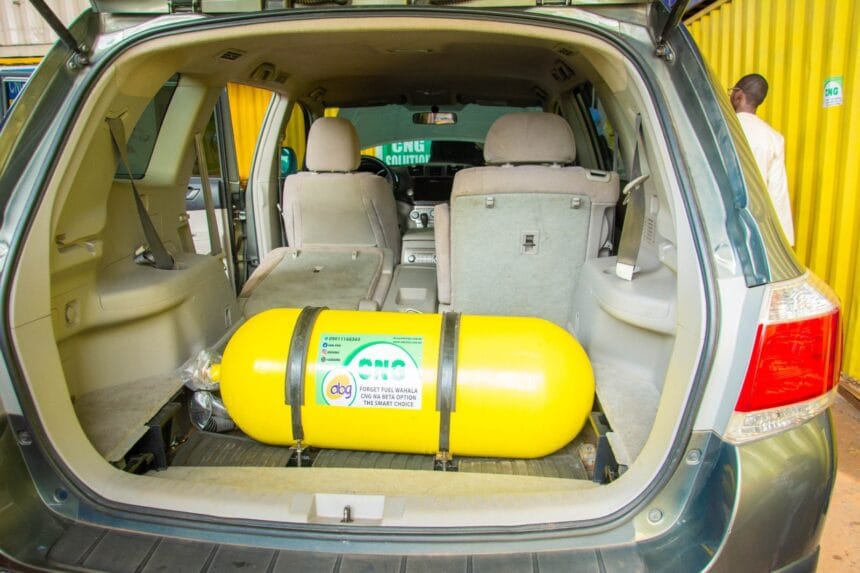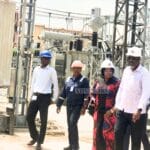…secures 10 hectares of land for establishment of CNG manufacturing hub in Ajaokuta, Kogi State
Oredola Adeola
The Presidential Committee on Compressed Natural Gas Initiative (Pi-CNG) has confirmed a significant increase in the number of CNG vehicle conversion centers in Nigeria, rising from seven in 2023 to 158 in 2024.
The goal, according to the agency, is to establish up to 1,000 centers nationwide.
Engr. Michael Oluwagbemi, Programme Director and Chief Executive of the Pi-CNG made this known during a panel discussion themed “From Policy to Practice: Strengthening Domestication for Economic Development” at the 13th Practical Nigerian Content Forum in Bayelsa, on Wednesday.
Oluwagbemi who was represented by Engr. Tari Mayor-Bright, Sovereign & Subnational Coordinator of Pi-CNG, outlined the progress and future plans of the Pi-CNG initiative.
According to him, “The goal of increasing the number of conversion centers is to facilitate the conversion of petrol cars to compressed natural gas (CNG) vehicles, creating a robust market for CNG stations,” Oluwagbemi stated.

“For ease of reference, if the minimum cost of conversion is ₦1,000,000, including kits and services, and our target is to convert up to five million cars, this would represent a market opportunity of approximately ₦5 trillion,” he stated.
“As we continue to import all the kits, can we begin refocusing on achieving local manufacturing of conversion kits and providing the enabling environment for Original Equipment Manufacturers to be domesticated in Nigeria?”
Oluwagbemi therefore disclosed the plan to establish a CNG manufacturing hub in Ajaokuta, Kogi State, where 10 hectares of land have already been secured, about one kilometer away from the Ajaokuta steel mill.
“While steel, heavy-duty, and other complex components can be manufactured abroad, Nigerian manufacturers should focus on producing key kit components locally, such as flexible pipes, filters, and valves.
“Producing these kits are not rocketing science,” he said.
“Even the Electronic Control Unit (ECU) can be developed through reverse engineering, and we are already in discussions with some partners to sign a knowledge transfer agreement to make this a reality.”
“Can we shift the conversation towards reducing the importation of most kits and focus on developing the skills and capacity to manufacture these components domestically?”
Oluwagbemi therefore called on the Nigerian Content Development and Monitoring Board (NCDMB) to collaborate on the development of the Ajaokuta CNG hub under the Nigeria Oil and Gas Park Scheme (NOGaPS).
“Pi-CNG is already in discussions with InfraCorp and other private partners to develop a CNG industrial park, providing an opportunity for the NCDMB to encourage local capacity and contribute through equity shares to consolidate the initiative,” he noted.
The Programme Director and Chief Executive of Pi-CNG revealed that there is significant potential for assembly plants dedicated to producing fully CNG-powered vehicles to operate in Nigeria.
“Pi-CNG is drawing investors’ attention to the available opportunities, focusing on the conversion of 500,000 additional commercial vehicles, excluding private vehicles yet to be converted.”
Oluwagbemi further emphasized the need to prioritize capacity building within the country, noting that Pi-CNG currently operates up to 100 training centers and aims to establish 1,000 institutes nationwide.
He said, “We are working with the Nigerian Institute of Transport Technology (NITT) to certify trainees and ensure that local mechanics have the skills to handle CNG conversions and maintenance.
“We aim to create opportunities for mechanics and entrepreneurs to own CNG maintenance or conversion stations,”
“There is an opportunity for investors to establish CNG maintenance centers, offering five-year contracts to car owners for servicing already converted vehicles, and these are the kinds of opportunities we are presenting.” he added.
Oluwagbemi highlighted the critical role of refueling units in the downstream CNG value chain.
He said, “We are witnessing queues at CNG refueling stations in some states, indicating a growing demand. This is a challenge but a good sign that the market is responding to Pi-CNG’s stimulation.
“Independent filling station owners are now considering retrofitting their facilities or adding CNG refueling units to meet this demand.” he said.
Oluwagbemi noted that while some IPMAN, and independent filling station owners initially expressed concerns over the cost of deploying CNG facilities and potential government policy inconsistencies, market dynamics have shifted in recent months, with the market now demonstrating significant potential.
“Owners of filling stations can now conduct market surveys and consider retrofitting their facilities or adding solutions, now that there is a growing demand for refueling centers, which is a clear signal of market growth,” Chief Executive of the Pi-CNG stated.
He explained that a recent estimate of the cost to set up an average CNG refueling station is about $600,000, based on recent data analysis and market surveys.
“While this could be on the high side for some independent players, it can be mitigated by the introduction of composite refueling units, which are CNG-in-a-box technology that we have monitored and found to have a high refueling timeline and faster refueling capabilities.”
“These portable units, modeled after technologies used in India, are being deployed in Nigeria and offer faster refueling capabilities.”
“Pi-CNG is currently working in conjunction with the NMDPRA to ensure the massive deployment of composite refueling units, presenting a significant opportunity for interested investors to co-locate with existing refueling facilities.
“The supply chain logistics of deploying these facilities are minimal, with most units being 40-foot containers containing full deployment kits, which are not assembled in Nigeria, and come with a booster pump,” he said.
As part of efforts to encourage midstream activities, Oluwagbemi revealed that Pi-CNG is promoting the pairing of CNG refueling units with compression facilities to create a direct supply chain from gas sources, emphasizing the importance of positioning mother stations close to gas supply sources to encourage upstream gas producers to reconsider their gas output.
“Last year, some of these players did not pay Pi-CNG much attention, but with the shift in market forces, there has been increased engagement with all major players on the commercial potential of CNG, as they recognize its importance.”
He expressed optimism about market dynamics attracting upstream gas producers and midstream operators to the growing CNG space in Nigeria.
“We are creating a beautiful interplay in the CNG value chain, despite initial challenges,” he remarked.
The initiative is also exploring the deployment of mini-LNG solutions ahead of the AKK pipeline completion.
“Pi-CNG has entered into an equity agreement with a company in Ajaokuta to develop a mini-LNG facility, with support from the Bank of Industry and the Nigerian Midstream and Downstream Petroleum Regulatory Authority (NMDPRA). Approvals are currently underway,” he concluded.




